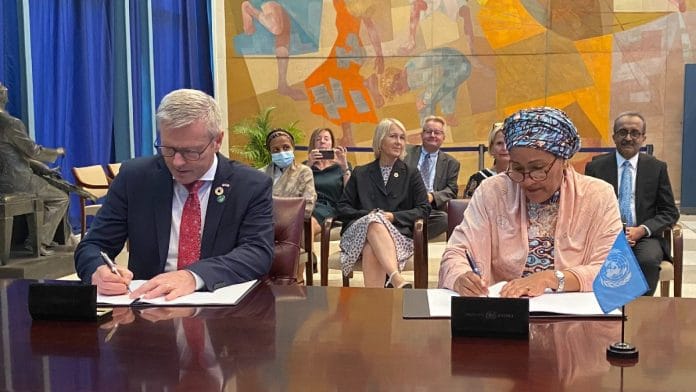New Delhi: Denmark — the first country to make such a move — will donate $13 million in “loss and damages” to developing countries vulnerable to the effects of climate change, in a bid to compensate for the vastly disproportionate consequences of global emissions.
Denmark made the “historic” pledge on 20 September, on the sidelines of the United Nations General Assembly (UNGA) in New York. The commitment came months ahead of the UN Climate Change Conference (COP27) to be held in Egypt from 6 to 18 November.
“It is grossly unfair that the world’s poorest should suffer the most from the consequences of climate change, to which they have contributed the least,” said Danish development minister Flemming Møller Mortensen. He added that with this new agreement, Denmark is “putting action behind words and working across civil society, authorities, the private sector and experts to solve one of the biggest challenges of our time”.
But what can $13 million do to address problems of this scale? Pakistan alone incurred economic losses to the tune of $18 billion as a result of the floods that have ravaged the country this year. Estimates suggest that the floods displaced more than 330 lakh Pakistanis and washed away over 80 lakh acres of crops.
Avantika Goswami of Delhi-based think tank Centre for Science and Environment told ThePrint that the pledge is a good start in terms of “setting a precedent for other wealthy countries to also open up their wallets and correct historic wrongdoing”.
“If this breaks the resistance upheld by the developed world towards loss and damage funds in the past three decades, then it can definitely be considered a positive step,” said Goswami.
Also Read: Between China, climate change & development, Ladakhi nomads are losing grip on their land
‘Fossil fuel addiction’
Earlier this month, a decision was made to retain ‘finance to address loss and damage’ on the provisional agenda for COP27 in accordance with a request by Climate Action Network — a global network of more than 1,800 civil society organisations in over 130 countries.
The request, conveyed in a letter to the heads of delegations who will negotiate on behalf of their governments at COP27, was signed by 43 national organisations and over 400 regional activist groups.
“The most recent IPCC 6th Assessment Report is unequivocal that human-induced atmospheric greenhouse gases are the cause of the climate crisis. This is a crisis primarily driven by decades of emissions from rich industrialised nations,” the letter said, referring to the reports of the Intergovernmental Panel on Climate Change, a UN body.
On 23 September, global climate advocacy group Fridays for Future organised demonstrations at 450 locations around the world to demand that rich countries pay for the damage inflicted on the poor by global warming. Demonstrations were also held in parts of Africa — including in the Horn of Africa, which is experiencing its “worst drought in more than 40 years”.
UN Secretary-General António Guterres, too, brought up the issue of climate-induced disasters during his interaction with the press last week. “You have all seen the appalling images from Pakistan. This is happening at just 1.2 degrees of global warming. And we are headed for over 3 degrees,” Guterres said.
Spelling out a framework for COP27, Guterres said more efforts are needed to keep global warming under 1.5 degrees — as decided under the Paris Agreement — and that emissions must decline by 45 per cent before 2030.
He also called on G20 countries, a group of which India is also a part, to “end our fossil fuel addiction”.
India, according to the government, has “contributed only around 4 per cent of global cumulative emissions from 1850 to 2019” despite its huge population — less than its share of the global carbon budget.
The budget determines the input of carbon dioxide into the atmosphere by emissions from human activities, balanced by output in carbon reservoirs, either on land or in the ocean.
Meanwhile, speaking at the UNGA last week, Nikenike Vurobaravu, President of Vanuatu — an island nation in the Pacific — called on countries around the world to sign a fossil-fuel non-proliferation treaty. If enacted, such a treaty would end all new coal, oil, and gas projects; while phasing out those that currently exist.
(Edited by Amrtansh Arora)
Also Read: Pregnant women in Pakistan left at lurch as floods wash away maternal healthcare






